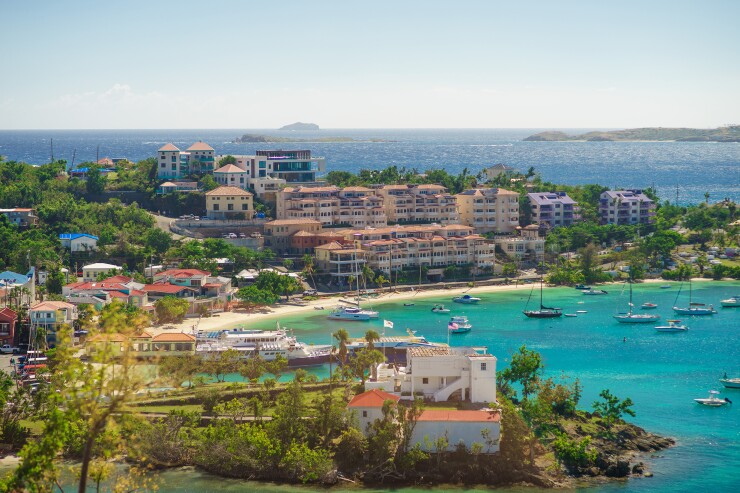A bill said needed to avoid USVI default languishes
4 min read

Two Congressional bills to permanently raise the rum cover rate supporting some U.S. Virgin Islands and Puerto Rico bonds are languishing, with a possible financial crisis coming as soon as 2028.
Two federal bills, HR 3146 and S1477,
The rum cover, a tax on rum sold in the 50 states, provides a revenue stream supporting USVI matching fund bonds and Puerto Rico Infrastructure Finance Authority rum bonds.
Adobe Stock
The rate had been raised to $13.25 per proof gallon for several years to help after hurricanes devastated the area in 2017, but when the increase expired in August, 2022, the U.S. Office of Insular Affairs said the rate would return to $10.50, where it currently sits.
Moody’s Ratings said in September 2022 the government’s pension system could run out of money as soon as October 2028 without the higher rum cover over rate. Moody’s has since withdrawn
If the tax was held at $10.50, it would cost the USVI government $60 million per year, according to USVI Sen. Janelle Sarauw, who added in 2023 that would threaten the financial stability of the USVI government.
“Congressional inattention to the territories is a primary credit weakness in their securities,” said Municipal Market Advisors Partner Matt Fabian. “Things might have to get really bad before Congress feels compelled to move.
“There is still time before a default would occur, and the Virgin Island’s concentrated ownership would allow an easier payment restructuring than what happened to Puerto Rico,” Fabian said. “But the lack of information on all this is troubling for the market at large; without transparency, liquidity is a problem.”
Municipal Markets Analytics Managing Director Lisa Washburn said, “The entire point (and structure) of the securitization was to rescue the pension fund from insolvency and it is not generating the expected contribution because of the lower cover over rate. It was reported in the press that they were short of the expected pension contribution by ~$34M and the government isn’t in a position to make it up. There is certainly a lack of transparency. If the pension runs into cash-flow trouble making benefit payments, I think the situation escalates and the transaction comes under pressure. But as Matt says there is still time.”
Muni Credit News Publisher Joseph Krist said, “given the bipartisan sponsorship, it’s clear that the Virgin Islands are caught up in the inability of the majority in the House to move anything. At the same time, the Virgin Islands do not have Congressional supporters the way Puerto Rico does (not that it resulted in good outcomes for Puerto Rico) so there is no real source of pressure (votes) to drive the bills.”
In February, 2023, USVI Gov. Albert Bryan Jr. said raising the rate was one of his goals.
Sen. Bob Menendez, D-N.J., Sen. Bill Cassidy, R-La., introduced the new bill in May in the Senate, while Rep. Jenniffer González Colón, R-P.R., and Rep. Stacey Plaskett, D-V.I., submitted it in the House of Representatives.
In summer 2022, Moody’s Senior Credit Officer Thomas Aaron said, “The reduced rum tax cover-over rate makes less money available to contribute to [the USVI Government Employees’ Retirement System], and contribution inflows are critical to the solvency of GERS.”
Should GERS run out of assets, the islands’ government “cannot likely afford the cost of paying pensions in their entirety to retirees while concurrently delivering core governmental services and paying debt service,” Aaron said. “Since it is politically unlikely that the USVI would prioritize debt service over retiree pensions, lower contribution inflows to GERS are credit negative.”
The most recent available ACFR for the U.S. Virgin Islands is for the fiscal year ending Sept. 30, 2021. As of that date the government had $1.648 billion in bonds and notes payable, excluding the of the Water and Power Authority. Of that $949 million were matching funds bonds.
The government refinanced them in April 2022 using a special purpose securitization corporation. KBRA rates them BBB.
The other bonds are unrated.
The Bond Buyer sought comment from USVI Delegate Stacey Plaskett, Puerto Rico Resident Commissioner Jenniffer González Colón, spokespeople for the Congressional committees handling the bills, KBRA, the administrator of GERS, Bryan, and several current and former USVI Senators, but did not receive comments back by press time.







